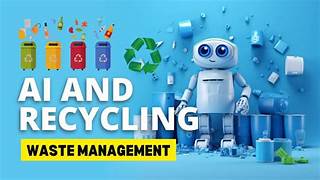The Use of AI in Improving Waste Management Systems
Effective waste management is a critical challenge in our rapidly urbanizing and industrializing world. As populations grow and consumption increases, so does the generation of waste, leading to significant environmental and logistical issues. Artificial Intelligence (AI) offers transformative solutions to modernize waste management systems, making them smarter, more efficient, and environmentally friendly. This article explores the diverse ways AI is revolutionizing waste management, its benefits, challenges, and the promising future it holds.
1. AI in Waste Sorting
One of the most impactful applications of AI in waste management is in automated waste sorting. Traditionally, waste sorting relies heavily on manual labor or rudimentary mechanical processes, which are often inefficient and error-prone. AI-powered systems can enhance these processes by identifying and separating waste with high accuracy.
Key Advancements:
- Image Recognition: AI-driven computer vision systems analyze waste on conveyor belts, identifying materials such as plastic, glass, metal, and organic matter in real time.
- Robotic Arms: Equipped with AI-guided sensors, robotic arms can sort waste faster and more accurately than human workers, reducing contamination rates and improving recycling efficiency.
- Smart Bins: AI-enabled bins use sensors and machine learning algorithms to identify the type of waste being disposed of and guide users to sort it correctly.
2. Optimizing Waste Collection Routes
Waste collection is a resource-intensive process involving significant logistical planning. AI helps optimize collection routes, saving time, fuel, and operational costs while reducing the carbon footprint.
Key Innovations:
- Dynamic Routing: AI analyzes real-time data, such as traffic conditions, waste bin fill levels, and weather forecasts, to determine the most efficient routes for waste collection trucks.
- Predictive Analytics: Machine learning algorithms predict when bins are likely to be full, enabling proactive scheduling and reducing unnecessary trips.
- Fleet Management: AI-powered systems monitor vehicle performance and fuel usage, ensuring timely maintenance and efficient operations.
3. Waste Reduction and Recycling
AI is playing a pivotal role in promoting waste reduction and improving recycling processes. By analyzing waste generation patterns, AI helps identify opportunities to minimize waste and maximize resource recovery.
Key Contributions:
- Material Recovery Facilities (MRFs): AI enhances the efficiency of MRFs by identifying valuable materials that can be recycled and separating them from contaminants.
- Consumer Insights: AI analyzes consumer behavior and waste disposal patterns, encouraging sustainable practices through targeted campaigns or incentives.
- Circular Economy Support: AI facilitates the tracking and repurposing of materials, supporting a circular economy where waste is continuously reused or recycled.
4. Addressing E-Waste Management
Electronic waste (e-waste) is a growing concern, given its hazardous components and rapid accumulation. AI offers innovative solutions to manage e-waste effectively and sustainably.
Key Strategies:
- Disassembly Automation: AI-powered robots can dismantle electronic devices with precision, separating valuable components like gold, silver, and rare earth metals for recycling.
- Material Identification: Advanced AI systems identify different types of plastics and metals in e-waste, ensuring accurate sorting and recycling.
- Lifecycle Analysis: AI predicts the end-of-life stage of electronic products, guiding manufacturers and consumers toward sustainable disposal methods.
5. Smart Waste Monitoring
AI enhances waste monitoring systems, enabling real-time tracking of waste generation, disposal, and processing. This data-driven approach ensures better decision-making and resource allocation.
Key Applications:
- Sensor Integration: AI-powered sensors installed in bins and landfills monitor waste levels, types, and decomposition rates.
- Real-Time Reporting: AI platforms provide actionable insights to municipalities and waste management companies, enabling swift responses to emerging issues.
- Environmental Impact Assessment: AI models analyze the environmental impact of waste disposal methods, guiding stakeholders toward more sustainable practices.
6. AI in Composting and Organic Waste Management
Organic waste accounts for a significant portion of global waste and is often underutilized. AI is transforming organic waste management by improving composting processes and bioenergy production.
Key Developments:
- Composting Efficiency: AI monitors factors such as temperature, humidity, and microbial activity to optimize composting conditions and reduce processing times.
- Anaerobic Digestion: AI systems enhance the efficiency of anaerobic digestion, a process that converts organic waste into biogas and nutrient-rich fertilizers.
- Food Waste Reduction: AI analyzes supply chain data to identify areas where food waste can be minimized, from production to consumption.
7. Challenges in AI Integration
Despite its potential, integrating AI into waste management systems is not without challenges. These obstacles must be addressed to fully realize the benefits of AI-driven waste management.
Key Challenges:
- High Initial Costs: Implementing AI systems requires significant investment in technology, infrastructure, and training.
- Data Privacy Concerns: The collection and analysis of waste-related data raise privacy concerns, especially in urban areas.
- Technical Limitations: AI models require large datasets and continuous refinement to ensure accuracy, which can be resource-intensive.
- Resistance to Change: Adopting AI solutions often faces resistance from stakeholders accustomed to traditional waste management methods.
8. Ethical and Environmental Considerations
The use of AI in waste management also raises ethical and environmental questions that need to be addressed responsibly.
Key Concerns:
- Job Displacement: Automation could lead to job losses in sectors traditionally reliant on manual labor, requiring reskilling programs for affected workers.
- Energy Consumption: AI systems, especially those involving machine learning, require significant energy, potentially offsetting environmental benefits.
- Inclusive Design: AI solutions must be designed to accommodate diverse waste management needs across regions and socioeconomic groups.
9. Future Prospects of AI in Waste Management
The future of AI in waste management is filled with exciting possibilities. As technology evolves, its applications will become more sophisticated and accessible, driving further advancements.
Emerging Trends:
- Decentralized Waste Management: AI enables localized waste processing units, reducing the need for large-scale transportation and disposal.
- Integration with IoT: Combining AI with the Internet of Things (IoT) creates smart waste ecosystems, where devices communicate and collaborate for efficient waste handling.
- Policy Support: Governments and organizations are increasingly recognizing the value of AI in waste management, leading to supportive policies and funding initiatives.
10. Conclusion
AI has the potential to revolutionize waste management systems, addressing pressing environmental and logistical challenges. By enhancing efficiency, promoting sustainability, and reducing waste, AI can pave the way for smarter and greener waste management practices. However, realizing this potential requires overcoming challenges related to cost, data privacy, and ethical considerations. With continued innovation and responsible implementation, AI can transform waste management into a cornerstone of sustainable development, benefiting communities and the planet alike.


